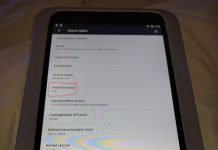 I’m not sure I follow this story, but if it’s true it could be important for the burgeoning Android device market. The blog Paris Lemon points to a story that’s been buried under today’s spate of Kindle news: Microsoft just issued a press release concerning a patent portfolio cross-licensing partnership it just signed with Samsung.
I’m not sure I follow this story, but if it’s true it could be important for the burgeoning Android device market. The blog Paris Lemon points to a story that’s been buried under today’s spate of Kindle news: Microsoft just issued a press release concerning a patent portfolio cross-licensing partnership it just signed with Samsung.
Included in the press release is the sentence, “Under the terms of the agreement, Microsoft will receive royalties for Samsung’s mobile phones and tablets running the Android mobile platform.” Paris Lemon points out that this means that of the three major Android OEMs, Samsung and HTC are both paying Microsoft now, and Motorola is being bought by Google.
Paris Lemon writes:
Evil or not, it sure looks like Steve Ballmer was right: Android is not free. No, you don’t have to pay Google to use it — but you do have to pay Microsoft.
And that’s genius. If you decide to use Windows Phone, Microsoft wins because you pay them a licensing fee. If you decide to use Android, Microsoft wins because you pay them a licensing fee.
This will force more vendors to consider Windows Phone because, why not? They’re paying Microsoft either way.
And who knows what this will mean for Amazon or Barnes & Noble, which are rocking their own versions of Android in their respective tablets? Will they have to pay Microsoft too?
It seems more than a little ridiculous that Microsoft should rake in royalties for an operating system built by Google on top of an open-source base, but that’s tech patents for you.
In a possibly related note, the MeeGo OS (a combination of Nokia’s Maemo and Intel’s Moblin OSes being jointly developed by the two companies) might just be lurching back from the grave. (I do have to admit, it makes sense for an OS whose name is pronounced the same as one of H.P. Lovecraft’s monsters to do that.)
Even though Nokia decided to switch to Windows Phone earlier this year, and Intel supposedly killed its MeeGo development branch off earlier this month, Samsung has now entered into a partnership with Intel to rebrand the OS as “Tizen” and slap it onto devices that place heavy emphasis on HTML5 apps. Tizen would be built from the ground up to support HTML5, meaning it could do a better job of it than simply “slapping a web runtime on an existing Linux.”
So perhaps Samsung is seeking an alternative to Android in order to stop having to pay royalties to Microsoft? In any event, it’s hard to imagine this progression of minor OSes with funny names making much headway against the more popular Android and iOS devices. But then again, sometimes improbable things do happen.
































So, what exactly does Microsoft own that Samsung and HTC have to license? I thought that Android was a Google invention.
Well, the info is in that “was right” link in the blockquote. Apparently the way that Android does some things infringes on some patents held by Microsoft. And rather than go after Google directly about it, Microsoft has gone after Google’s OEM partners.
It really is ridiculous, but that’s why all the phone and tablet manufacturers are suing each other these days.
Reading through the info at that link, I come to: “Those patents may very well be legit — it’s not exactly clear what they are …” Perhaps it’s just too arcane to get into.
Oracle has a more damning claim, see: http://www.infoworld.com/t/intellectual-property/oracles-android-lawsuit-pandoras-box-serious-evils-359 This is a clear assertion of IP theft which names the article stolen.
Oracle might well demand even more than a pound of flesh.